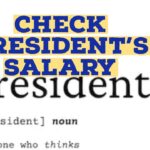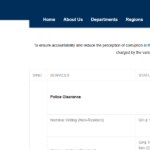Navigating Ghana’s Payroll System: Understanding Validations, Suspensions, and Ensuring Timely Salary Payment.
For public sector employees in Ghana, receiving their monthly salary is a crucial expectation. However, the payroll system, managed by the Controller and Accountant-General’s Department (CAGD), has mechanisms in place to ensure accountability and prevent irregularities. Understanding these processes, particularly payroll validation and the reasons for salary suspension, is vital for every government worker to avoid potential disruptions in their income.
This comprehensive article delves into the intricacies of the CAGD payroll system, outlining the reasons why your salary might not be validated or could be suspended, and providing insights into how to navigate these situations effectively.
The Crucial Role of Payroll Validation
At the heart of ensuring accurate and timely salary payments lies the process of payroll validation. Regulation 304 of the Financial Administration Regulation, 2004 (LI 1803) mandates that Heads of Management Units and Human Resource (HR) officers play a pivotal role in confirming the legitimacy of employees under their purview.
Here’s why validation is so important:
- Ensuring Accuracy: Validation confirms that the individuals listed on the payroll are indeed active employees within the specified Management Unit.
- Preventing Fraud: This process acts as a crucial check against “ghost names” and other forms of payroll fraud, safeguarding public funds.
- Maintaining Data Integrity: Regular validation helps keep the employee data on the Electronic Salary Payment Voucher (E-SPV) system up-to-date.
In specific regions, the CAGD explicitly requires both the Head of the Management Unit and the HR Officer to validate employee salaries each month through the E-SPV system. Failure on the part of either to perform this validation directly translates to employees within that Management Unit not receiving their salaries for that month.
The CAGD emphasizes the importance of Heads of Departments taking a keen interest in this process to ensure their respective units comply with the validation requirements.
For your Payroll Loans, contact Seekers Consult 247 on 0550414552
Reasons Why Your Salary Might Not Be Validated or Could Be Suspended
Follow our Channel on WhatsApp for More Updates Follow Here
Several factors can lead to your salary not being validated or, in more serious cases, being suspended by the CAGD. Understanding these reasons is the first step towards preventing such occurrences.
1. Non-Validation by Management Unit Heads and HR Officers: As highlighted earlier, if the designated Head of your Management Unit and the HR Officer fail to validate the salaries on the E-SPV system, your salary will not be processed for that month.
2. Change of Management Unit: When an employee is transferred to a different Management Unit, it’s imperative to ensure that the validators in the new unit validate their details promptly. Failure to be validated by the new unit’s validators will result in salary payment issues.
3. Absence of Validation (Not Being a Validator): If an employee is not designated as a validator, their own salary still depends on the validation performed by the authorized personnel within their Management Unit.
4. Salary Goes Off (Blocked Salary): When a salary is blocked due to non-validation or other discrepancies, restoring it is a bureaucratic process that can take considerable time and effort. Instances of salary restoration taking up to six months are not uncommon, often requiring the submission of formal “salary restoration letters.”
5. Vacation of Post Without Proper Letter: If an employee vacates their post without the institution having a formal record of their departure (e.g., resignation letter, official leave approval), they will likely be marked as inactive, leading to suspension and non-validation of their salary.
6. Study Leave Without Pay: Opting for study leave without pay means that there is no provision for salary payment during the leave period. Even upon completion of the study leave, reinstatement requires adherence to proper procedures and approvals. Failure to follow these procedures may result in continued non-payment.
7. Insubordination: Disrespecting or being insubordinate to the heads of your Management Unit can have administrative repercussions, potentially including the non-validation of your salary.
8. Negligence on the Part of a Validator: If a designated validator within your Management Unit is negligent in their duties and fails to perform the necessary validations, it can impact the salaries of all employees within that unit.
9. Sabotage by a Validator: In rare and serious cases, a validator might intentionally fail to validate salaries, leading to widespread payment issues.
10. Inconsistencies with National Identification Authority (NIA) Numbers: As recently highlighted in March 2025, the CAGD has been actively working to clean the payroll data by verifying employee NIA numbers.1 Discrepancies or inconsistencies in these numbers can lead to immediate salary suspension. Affected institutions are required to submit corrected staff lists to rectify these issues.
11. Zero Bank Account Details: In a 2014/2015 exercise aimed at cleaning the mechanized payroll data, employees with zero bank account details were suspended. While a significant number were restored after providing the necessary information, failure to do so within the stipulated timeframe could lead to permanent deletion from the payroll.
What to Do If Your Salary is Not Paid Due to Non-Validation
If you find yourself in a situation where your salary has not been paid due to non-validation, here are the steps you should take:
- Contact Your HR Department: Your first point of contact should be your institution’s HR department. They will be able to ascertain the reason for the non-payment and whether it is related to the validation process.
- Engage Your Head of Management Unit: If the issue stems from non-validation, your Head of Management Unit needs to take immediate action to validate the outstanding salaries on the E-SPV system.
- Follow Up on Corrected Data Submission (for NIA Issues): If the non-payment is due to NIA inconsistencies, ensure that your HR department has submitted the corrected data by the stipulated deadline. Follow up with them to confirm the submission.
- Prepare a Salary Restoration Letter (if applicable): If your salary has been blocked for an extended period, your HR department will likely guide you on the process of writing and submitting a formal salary restoration letter. This will involve providing necessary documentation and justifications.
- Visit the CAGD Website: The CAGD often publishes lists of Management Units with non-validated salaries and may provide further instructions or updates on their website.2 Regularly checking their official communication channels is advisable.
- Contact Designated CAGD Officials (for NIA Issues): In the case of NIA-related suspensions, the CAGD has provided specific contact persons (Naakie Osam-Sackey and Michael Arku-Kelly) for clarifications.3
CAGD’s Commitment to Payroll Integrity
The CAGD’s rigorous approach to payroll management, including regular clean-up exercises and the emphasis on validation, underscores its commitment to maintaining the integrity of the government’s wage bill. These measures are crucial in:
- Controlling the Wage Bill: By eliminating irregularities like “ghost names,” the CAGD aims to contain the increasing wage bill, which poses risks to the national budget and macroeconomic stability.4
- Ensuring Fiscal Consolidation: These efforts align with broader Public Financial Management (PFM) reforms aimed at achieving fiscal consolidation targets.
- Promoting Accountability: The validation process and the consequences of non-compliance promote accountability among Heads of Management Units and HR officers.
Navigating the CAGD payroll system requires understanding the critical role of validation and the various reasons why salaries might face suspension. By being aware of these processes, ensuring timely communication with your HR department during any changes, and adhering to institutional regulations, public sector employees in Ghana can minimize the risk of salary payment disruptions. The CAGD’s ongoing efforts to enhance payroll integrity ultimately aim to create a more transparent and efficient system for all stakeholders. Remember to stay informed through official channels and act promptly should any salary-related issues arise.
Has Your Salary Ever been Suspended? How did you resolve it? source; seekersconsult247.com







